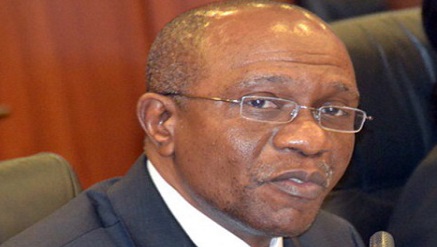E-Financial
CBN Lists Benefits of PSV 2020 Initiative

The Payments System Vision 2020 (PSV2020) initiative of the Central Bank of Nigeria (CBN) has been described as a catalyst in the revolutionised payment system landscape of the country.
Besides, it has been assessed to have facilitated economic activities, by providing safe and efficient mechanisms for making and receiving payments with minimum risks to the central bank, payment service providers and end users, extending the availability and usage to all sectors and geographies, banked and unbanked, and conforming to internationally accepted regulatory, technical and operational standards.
Godwin Emefiele, CBN governor, who made the observation at the inauguration of the Payments System Strategy Board, Scheme and Initiative Working Groups, reiterated that the core objective of PSV2020, was to make our payments system “nationally utilised and internationally recognised”.
He added: “It is gratifying to note that our country is not only acknowledged as a major economic force within Africa, but also increasingly becoming an active player in the global economy and to participate actively, our payments system must be successfully benchmarked against the global best practices.”
Emefiele noted that through the implementation of the original PSV2020 initiatives by the CBN, in association with the banking community, Nigeria has witnessed an impressive growth of electronic payments and a shift from the overwhelming dominance of cash as a means of payment.
He listed the implementation of the Nigeria Uniform Bank Account Number; deployed the real time gross settlement systems where transfer of money or securities takes place from one bank to another on a “real time” and on “gross” basis, without waiting period; and the popular cash-less policy.
Others were the deployment of deployment of the Scripless Securities Settlement System; introduction of Cheque Truncation, which reduced clearing cycles for Automated Clearing House payments and cheque from three days (T+2) to next day (T+1); and enthronement of limits on encashment of third party cheques and a maximum cap of N10 million for cheque payments, to encourage the use of electronic payments channels.
There were also the adoption of mobile money as a major channel for delivering financial inclusion; support for the implementation of the Federal Government’s Treasury Single Account; and migration of all payment cards from magnetic stripe technology to Chip-and-PIN, otherwise known as EMV, due to the assessed weaknesses of the former.
According to him, though the system has recorded some significant achievements so far in this journey, a lot still remains to be done and we do not intend to rest on our oars.
However, the new focus, which emerged from a detailed assessment of the Nigerian payments infrastructure, identified eight new industry verticals aimed at advancing the adoption of the electronic payments in Nigeria.
The CBN chief pointed out that in agriculture sector, the focus would be to develop electronic payment methods to support the value chain from inputs to tertiary production and supply, while a cashless model for Smart Cities will be developed.
For the smart cities scheme, the focus will be on both existing cities and “greenfield cities”, to ensure that less cash is used as a means of payment in retail outlets, transportation, and food.
Government’s cash flows would be reformed to ensure adoption of end-to-end electronic channels for all forms of salaries, pensions, suppliers, individual & business taxes payment and collection of revenues by private and public sector organisations.
In hotel and entertainment, there would be need to work with key pilot hotels and other key entertainment venues such as restaurants, cinemas, sports centres to promote the cash-less initiative.
Under the transportation sector, he said the new focus would develop strategies for getting the public to pay for transportation (inter-city and intra-city) electronically, while a pilot implementation would be organised with various transportation companies.
Expressing confidence on the success of in the transport sector, he said that a lot of traction has been gained on this initiative on air transportation, while a lot still remains to be done on land, water and rail transport systems.
Other areas of focus include education, health and bill payments and direct debits, by designing and developing channels with components such as grants, scholarships, consultancy services, Internally Generated Revenue (IGR), tuition and administrative fees, provision of personal and medical information and payments for health and medical services and driving the current initiative for bill payments like insurance, pensions, telecommunications, Cable TV and utilities to conclusion.
To achieve these, CBN invited nominations from the stakeholders for capable people to serve in any of the new Initiative Working Groups, one for each industry vertical, comprising the user community, banks and other service providers.
The groups will work on the principle of identifying quick wins for an initial period of two years, with an option to extend for another two-year term, subject to the level of achievements.
E-Financial
UBA launches instant digital platform for seamless account opening across Africa, diaspora

United Bank for Africa (UBA) Plc, Africa’s leading financial institution, on Tuesday unveiled a groundbreaking instant account opening platform, revolutionising banking access for millions across the continent and diaspora communities worldwide.

UBA
The fully digital innovation, accessible at ubagroup.com, empowers prospective customers to complete account onboarding online in minutes, bypassing paperwork, branch visits, and lengthy processes that have long hindered financial inclusion. Supporting Naira and Diaspora accounts with multi-language options, the platform operates seamlessly on computers, tablets, and smartphones, catering to UBA’s diverse pan-African footprint spanning 20 countries, the UK, US, France, and UAE.
Shamsideen Fashola, Group Head of Retail and Digital Banking, described the launch as a pivotal step in democratising finance. “At UBA, we are committed to redefining the customer experience through innovation and simplicity,” Fashola said. “This fully digital solution underscores our belief that banking should be accessible, secure, and truly borderless.”
The seven-step process is intuitive: customers select “Open a Savings Account,” input their Bank Verification Number (BVN), undergo facial verification, confirm an OTP, update details, upload documents, add a digital signature, and receive an instant account number. This bridges traditional banking rigour with fintech speed, incorporating digital KYC while upholding stringent security.
Built with compliance at its core, the platform adheres to Nigeria’s Data Protection Act (NDPA) and Europe’s GDPR, safeguarding user privacy amid cross-border operations. Unlike conventional methods requiring physical biometrics, it enables immediate enrolment in UBA’s digital channels, blending convenience with regulatory depth.
Alero Ladipo, Group Head of Brand, Marketing, and Corporate Communications, highlighted customer-centric design. “Today’s customers expect speed, convenience, and compliance without compromise,” Ladipo stated. “We have blended industry-leading digital onboarding with robust standards for a seamless experience matching global best practices.”
The move reinforces UBA’s dominance in technology-driven inclusion, serving over 50 million customers with 30,000 employees and pioneering retail, commercial, and institutional services. Analysts view it as a strategic edge over fintech rivals, accelerating Africa’s digital economy amid rising diaspora remittances and intra-continental trade.
As Nigeria and Africa push financial digitisation, UBA’s platform positions the bank to capture untapped markets, fostering economic growth through barrier-free banking
E-Financial
Kuda MFB Secures National Microfinance Banking Licence, Sets Stage for Nationwide Growth

Kuda Microfinance Bank (Kuda MFB) has received a license from the Central Bank of Nigeria (CBN) to operate as a National Microfinance Bank, which means that it can now have a physical presence across Nigeria.

Musty Mustapha, MD/CEO of Kuda MFB
With the Unit Microfinance Bank licence it held until December 2025, Kuda MFB’s physical operations were limited to a specific location. The national licence removes those geographic restrictions, allowing the bank to open customer experience centres in multiple parts of the country. It also regularises Kuda MFB’s licensing status in line with the Central Bank’s framework for microfinance banks.
According to the bank, the national licence is about regulatory alignment and operational flexibility rather than a shift away from its digital-first model, so it will continue to lead with digital banking services, offering Nigerians the convenience of making transfers and payments, saving, and accessing instant credit through the Kuda app.
Musty Mustapha, MD/CEO of Kuda MFB, said, “Securing a national microfinance banking licence is an important step for us as a regulated institution. It strengthens our relationship with the Central Bank and affirms our commitment to operating at the highest standards of compliance as we scale. While we remain digital at our core, this licence gives us the flexibility to create more physical touchpoints where customers want in-person support or engagement, allowing us to serve Nigerians across the country in whichever ways are most convenient for them.”
Subject to regulatory approval, Kuda MFB plans to open more experience centres designed for customer support and community engagement, in the style of its existing experience centre in Yaba, Lagos, where customers and the general public can speak directly with the Kuda team to get help and learn about the microfinance bank’s products and services.
Kuda MFB’s national licence does not change its existing product offerings or transaction capabilities, but it provides the regulatory backing for a nationwide presence.
E-Financial
NDIC Seeks EFCC’s Support to Trace, Recover Assets of Failed Banks

Nigeria Deposit Insurance Corporation (NDIC) and the Economic and Financial Crimes Commission (EFCC) have agreed to strengthen collaboration to enhance the investigation and prosecution of offences that lead to bank failures, while also improving the recovery of assets and debts of failed banks.

Thompson Oludare Sunday, managing director and chief executive of the NDIC, made this known during a courtesy visit by the Corporation’s management team to Olanipekun Olukoyede, executive chairman of the EFCC, at the Commission’s headquarters in Abuja.
In a statement issued on Sunday by the NDIC’s Hawwau Gambo, head of Communication and Public Affairs, Sunday said robust partnership with the EFCC is critical to the effective liquidation of failed banks, a process that involves asset realisation and debt recovery, with proceeds used to settle uninsured deposits.
He noted that cases of asset stripping and concealment require coordinated efforts, particularly in asset tracing, recovery and enforcement, adding that the EFCC’s expertise is vital in achieving these objectives.
Sunday also identified banking fraud investigations and the prosecution of individuals whose actions contribute to bank collapses as key areas where both institutions can further strengthen their cooperation.
He stressed that NDIC plays a vital role in maintaining financial system stability through the execution of its four statutory mandates in deposit guarantee, bank supervision, distress resolution and bank liquidation.
According to him, the Corporation’s overarching goal is to safeguard depositors’ funds, ensure prompt compensation when banks fail, and sustain public confidence in the financial system.
He also observed that both institutions share common values of integrity, professionalism and accountability, describing the visit as a step towards reinforcing institutional partnership, especially in areas where EFCC’s investigative and prosecutorial capacity is essential to NDIC’s mandate.
“We aim to further strengthen our collaboration, deepen institutional synergy and explore additional avenues for mutual support in the pursuit of national financial system stability.
“The EFCC has been our partner and we want this to continue. We look forward to an expanded and more impactful partnership between our two esteemed institutions.
“Your experience has and will continue to greatly enhance our recovery efforts. Additionally, we have that strategic responsibility for prosecuting individuals whose actions contribute to the failure of banks. We therefore seek closer collaboration with the Commission in this critical area”
Responding, the EFCC boss, Olukoyede, reiterated the Commission’s commitment to its longstanding working relationship with the NDIC in tackling financial crimes within the banking sector.
He acknowledged the history of cooperation between the two agencies, particularly in investigations and capacity development related to banking operations.
Olukoyede also briefed the delegation on key departments within the EFCC, including the Bank Fraud Section, which handles matters related to the NDIC.
He encouraged the Corporation to submit any outstanding cases for prompt assessment, noting that this would enhance tracking, accountability and case resolution.
The EFCC Chairman further highlighted the role of the Commission’s Fraud Risk Assessment and Control Department, which focuses on proactive monitoring, compliance, sound risk management and internal controls in both public and private sector institutions.
He described these efforts as part of the EFCC’s broader mandate to protect and strengthen the Nigerian economy.
Olukoyede assured the NDIC of the EFCC’s continued support in deepening institutional synergy to combat financial crimes, improve asset recovery, and ensure that offenders who undermine the banking sector are brought to justice.

 E-Financial2 days ago
E-Financial2 days agoCBN Upgrades Licences of Opay, Moniepoint, Kuda, Palmpay, Paga to National Status
- E-Financial2 days ago
Nigeria’s 9 Top FinTech Firms Valued at $10.6Bn in January 2026

 News2 days ago
News2 days agoTech Executives Double Down on AI, Talent and Adaptive Strategies to Lead in the Intelligence Age

 E-Financial2 days ago
E-Financial2 days agoNIBBS to Boost Financial Inclusion with Offline Payment Solutions

 News2 days ago
News2 days agoDHQ Indicts Brigadier General Abubakar Sadiq, 15 Others in Alleged Coup Plot againt Tinubu

 E-Business2 days ago
E-Business2 days agoFirm Identifies AI as Common Denominator in Entertainment Industry’s 2026 Security Threats

 General News2 days ago
General News2 days agoWEBINAR: Techeconomy Business Series Hosts Experts from MTN, Interswitch, BusinessPlus, others this Wednesday

 News2 days ago
News2 days agoCourt Fines Airtel N210m for Unauthorised Use of ‘Nigeria Go Survive’ Song

























